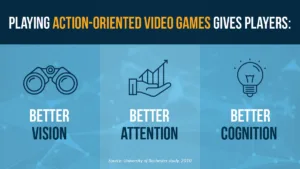Your mother may have warned you that playing too many video games would ruin your eyes. Mathieu Ferland would beg to differ. In fact, he says, it just might make them stronger.
Ferland is a producer on Dig Rush from Ubisoft Montreal, a game that’s being made in conjunction with Montreal’s McGill University to help people with amblyopia, better known as lazy eye. The disorder affects between 1% and 5% of the population. And the traditional therapy, for some 200 years, has involved eye patches.
The effectiveness of eye-patches has become a subject of debate among scientists, however. Among other things, they noted that the therapy was useless for adult patients. In 2015, Ubisoft and McGill began working on Dig Rush. The game, which will have to be prescribed to patients (both adults and children) by a doctor, utilizes both eyes to train the brain, using different contrast levels of red and blue and a specialized pair of stereoscopic glasses. It’s currently in the midst of clinical trials and Ferland says he expects the first approvals will come within months.

Expected treatment times for patients will range from eight to 12 weeks.
“The therapy can’t just be done from the app store or Google store, because it requires a … specific calibration,” says Ferland. “It’s more a type of optometric or prescription, but … it’s satisfying to know that soon this game will improve the sight of many patients around the world.”
The health benefits of video games extend far deeper and wider than many people realize. Several medical studies have shown that regular playtime can substantially improve both physical and mental well being.
Dig Rush, for instance, isn’t the only study looking at games and vision. The University of Rochester, in 2010, found that playing action-oriented games gives players better vision, better attention and better cognition. Those improvements help with activities like multitasking, navigating around town and reading small print.
Similarly, a study published in the American Journal of Play in 2014 found that the fast pace of many video games requires people to keep track of many items at once and make split-second decisions, positively affecting perception, attention, memory and decision-making, which many psychologists consider the core building blocks of intelligence.
A 2015 study from the University of Freiburg in Germany found that story-based games could be beneficial for people with autism, satisfying their need for socialization. That could help autism experts and developers develop software to help people with the disorder improve their social interactions with others, much like Dig Rush is helping people with amblyopia.
And several studies have found that incorporating video games into physical therapy can help people with Parkinson’s disease improve both their balance and gait as well as their mental faculties.
Games not only improve your health, they can actually improve your odds during surgery. A 2007 study found that surgical residents and medical students who played specific video games did better on laparoscopic surgery simulators than those who avoided games. How much better? Surgeon/gamers who played more than three hours per week made 37% fewer errors and were 27% faster. A year later, researchers discovered that playing Wii games like Marble Mania helped surgical residents improve both their fine motor skills and their performance on surgical simulators.
And in 2012, the University of Texas Medical Branch at Galveston compared how high school sophomore gamers, college gamers and non-gamer medical residents performed when using virtual surgery tools.
The high schoolers were the most adept.



